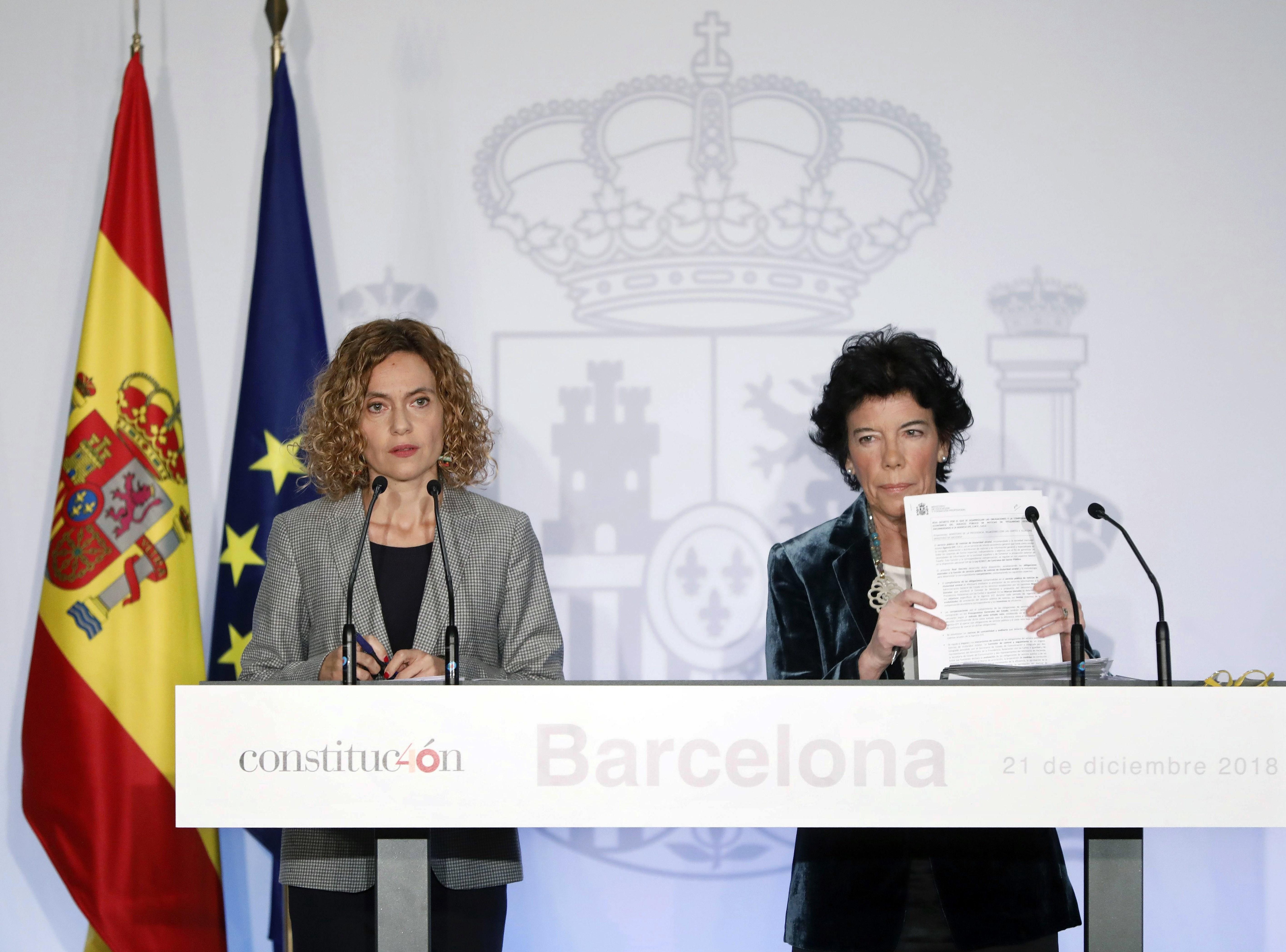This Friday's Spanish cabinet meeting in Barcelona has ended up changing the name of Barcelona-El Prat airport and with a new declaration about the execution of Catalan president Lluís Companys by the Franco regime, but with nothing new in relation to that which, this Thursday, the Catalan and Spanish governments agreed on describing as the Catalan "conflict".
The central government's spokesperson, minister Isabel Celaá, called on the independence of the judiciary as an excuse to not talk about the political prisoners when asked about the subject in the press conference after the meeting. As for the calls from the leader of Ciudadanos, Albert Rivera, to suspend Catalan autonomy again, she warned that the idea "doesn't offer a political response to the Catalan topic, at this time".
Both Celaá and her fellow minister Meritxell Batet carefully weighed up each and every one of the words they said during today's press conference, after yesterday's joint statement from the governments after their meeting sparked a flood of criticism from PP and Ciudadanos over the absence of a direct appeal to the Constitution.
Have any concessions been made to the independence movement, Celaá was asked. "Absolutely no concession," she said.
During the press conference, the rumble of the protests could be held in the distance, beyond the police cordons.
Asked about the obstacle the existence of political prisoners could pose to reaching a negotiated solution to the conflict, the minister would only say that Spain is under "the rule of law and the rule of law is based on the separation of powers". "The [Spanish] executive cannot interfere in the judiciary in any way, and it's the judiciary which determines prison or release," she said.
The Spanish government emphasised in today's appearance the need for a political solution to the issue, calling for "reciprocity" from the different political parties to chart the best course possible.
Given the questions raised about yesterday's statement and the lack of a reference to the Constitution, Batet noted that it does talk about legal certainty, which she says doesn't exist without respecting the Constitution, Catalonia's Statute of Autonomy and the rest of the law. "Dialogue and law" is, according to the minister, the summary of the agreement.
In fact, defence of the Constitution also became an argument to reject Rivera's calls for a new intervention in Catalan autonomy. Celaá criticised the leader of Cs for invoking the relevant article (no. 155) of the Constitution "as if it were the only one".
"Unless behind his permanent call, a desire for the perpetual recentralisation of Catalonia's autonomous powers is hiding... The government defends the Constitution in its entirety and the Constitution establishes a Spain of autonomous communities," she said. The spokesperson added that they don't want to return to a "Spain of sad memory, which doesn't know how to develop the diversity of the different territories of Spain".
Today, the cabinet meeting condemned the military tribunal that sentenced Catalan president Lluís Companys to execution by firing squad and proclaimed the "recognition and repair of his dignity". It did not, however, annul the trial because, the spokesperson says, that requires legislation which is underway through a bill in the Congress.
As for changing the name of Barcelona-El Prat airport to honour Josep Tarradellas, who returned from exile as the first president of Catalonia after the end of the Franco regime, the government believes it sends a message of "harmony, understanding and dialogue". It brushed off protests from the Catalan government that it's a unilateral decision which was communicated after it was taken to Torra's executive, the affected city councils and Tarradellas' family, saying there was a "more than reasonable agreement".
The government also approved 112.77 million euros' worth (£101 million; $128 million) of investment in roads "in the four Catalan provinces".
As already announced, the ministers approved raising the minimum monthly wage around 40€ to 900€ (£810; $1020). This will benefit, according to Celaá, some 2.5 million people.
They also approved an executive order of urgent measures over public sector pay, which will increase 2.5%, with another 0.5% linked to GDP. These last two measures will take effect from January.

